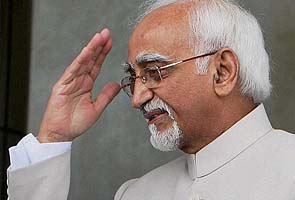 The Vice President of India Shri M. Hamid Ansari has said a fourfold approach to treat the deadly social ailment of Corruption and promote probity would lie in the combination of (a) ethical training in norms incorporated in legally enforceable Code of Ethics, (b) comprehensive protection of human rights, (c) a legal framework and regulatory practices that enforce clash of interest rules, and (d) laws and procedures that forbid nepotism in all its manifestations. These steps would assist the attainment of “excellence” in terms of the Duties prescribed in the Constitution. The endeavour is to be individual and collective. The matter of corruption is very much in the public domain. It has been said with much justice that “evidence of corruption has moved from anecdotal to documentary”, that it is Indian democracy’s “inconvenient fact”, that it violates human rights, constitutional rights and Rule of Law, and that “it undermines the very social fabric and the political and bureaucratic structure of the Indian society”.
The Vice President of India Shri M. Hamid Ansari has said a fourfold approach to treat the deadly social ailment of Corruption and promote probity would lie in the combination of (a) ethical training in norms incorporated in legally enforceable Code of Ethics, (b) comprehensive protection of human rights, (c) a legal framework and regulatory practices that enforce clash of interest rules, and (d) laws and procedures that forbid nepotism in all its manifestations. These steps would assist the attainment of “excellence” in terms of the Duties prescribed in the Constitution. The endeavour is to be individual and collective. The matter of corruption is very much in the public domain. It has been said with much justice that “evidence of corruption has moved from anecdotal to documentary”, that it is Indian democracy’s “inconvenient fact”, that it violates human rights, constitutional rights and Rule of Law, and that “it undermines the very social fabric and the political and bureaucratic structure of the Indian society”.
Delivering Annual Bhimsen Sachar Memorial Lecture on ‘Virtue in Public Life’ here yesterday, Shri Ansari expressed his deep concern that our ranking in the global Corruption Perception Index is, to say the least, distressing. The disease is not of recent origin but, in an earlier period, carried a social stigma less evident today. The perception of wide-spread corruption has widened and deepened in the public mind. Furthermore, there is a nagging apprehension that the administrative and judicial mechanism in place is inadequate as a deterrent.
He suggested that more effective corrective action is needed to restore public confidence. This has to be qualitatively different and must address three aspects of the matter simultaneously. These relate to (a) propensity, (b) opportunity, and (c) scope. Much of the debate on dealing with the perils of corruption has dealt with the legal framework and law enforcement and the effort to make it produce better results. This is essential but not sufficient. An aspect of the fight against corruption, insufficiently addressed, is its impact on human rights and the extent to which it derogates the Rule of Law that ensures administration of justice by normal law courts, avoidance of arbitrary decision-making, and abuse of discretionary power.
Referring to Nepotism, the Vice President opined that given our social scene and traditions, nepotism in some form or the other is, tacitly or explicitly, considered a virtue. It is said to be “a custom with infinitely more practitioners than defenders”. How is it to be defined in the Indian context of Kunba parvari ? When and where does it violate canons of probity and becomes a corrupt practise? Has any government or public body sought to develop a framework to check it?
He said that the desire and need for a virtuous society is not just a metaphysical goal which lies in the ethereal realm of religion or philosophy but has tangible benefits for common good of humanity. Virtue in public life provides a necessary, if not sufficient, framework for sustained and harmonious political, economic and social progress in society. Virtue in public life goes beyond the normal clamour for probity in Government and public administration and covers the entire spectrum of a citizen’s public activity. Similarly, virtue is not restricted to absence of corruption in financial or monetary terms, but includes values such as service, sacrifice, faith, trust, courage, justice and ethical conduct. As the philosopher Aristotle put it, virtue is a disposition for excellence in the human soul. This virtue can be acquired.
